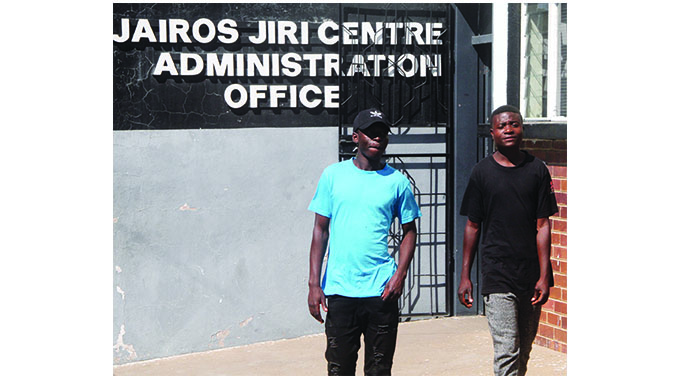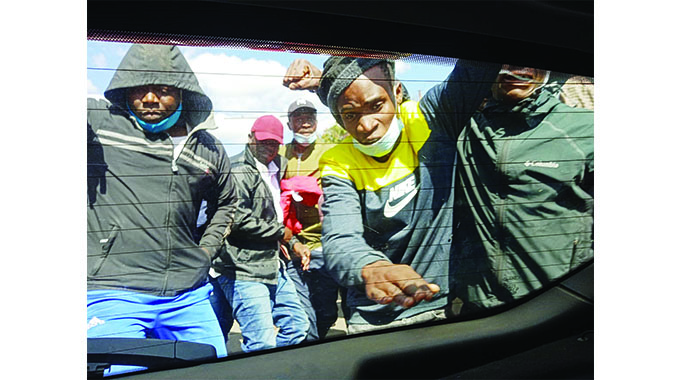The boys at Jairos Jiri Centre are gone for good!…the two remaining changing their lives

Raymond Jaravaza/Rufaro Winter, Showbiz Reporters
WHERE we were once greeted with cheerful voices of adolescents fooling around, engaged in animated conversations while standing in groups, we were welcomed by dead silence at a section of Jairos Jiri Association Centre in Nguboyenja suburb.
A year ago, at that same section where a dormitory located on the periphery of the centre stands, 40 boys were housed soon after the coronavirus outbreak in March 2020.
Boys ranging from eight to 17 years now called Jairos Jiri Association Centre home. For the younger ones, life at the centre was far much better compared to the harsh realities of living on the streets of Bulawayo. The younger boys relished the idea of eating three meals a day, sleeping under a roof with blankets provided by the centre. But they hated bathing in cold showers.
For the older boys who were used to living in the streets under no adult supervision and doing as they pleased without repercussions, withdrawal effects from years of drug and substance abuse proved the biggest downside of living in the centre.
Fast forward to slightly more than a year since Saturday Leisure last visited the place, the dormitory at the Jairos Jiri Association Centre now resembles a mini ghost town.
“The boys, except for just two brothers, are all gone. I have no doubt they are all back in the streets, back to their spots where they were rounded up by the police at the height of the Covid-19 outbreak last year,” said *Maria, the social worker who first tipped Saturday Leisure about the presence of streets kids at Jairos Jiri Association centre.
“These boys are used to doing whatever they want, whenever they want, so living under any form of supervision is alien to them. Some have been abusing substances such as glue and smoking mbanje, things that they couldn’t get here and they were suffering from withdrawal symptoms.
“I’m not surprised that they all ran away,” said Maria.
Faced with the temptation to follow their friends back to the streets, two brothers Clarence (18) and Bailey (22) Mbewe, instead saw an opportunity that could change their lives forever.
Theirs is a heart-wrenching tale of losing parents at a young age, being abandoned by relatives and subsequently ending up in the streets of Bulawayo, far away from their city of birth.
Originally from Kadoma, life changed for the worst for the brothers when their mother fell ill and passed away.
“We grew up in Kadoma and lived a normal life with our parents until our mother fell ill and passed away in 2005. That’s when everything changed. A few months after her funeral, our father just took off, leaving us with the maid. We never heard from him again.
“My brother and I were very young, but I remember the landlord grabbing our household property to cover the rentals until we were left with nothing and he kicked us out of his house,” narrated Bailey.
Life took a short resemblance to normalcy when the boys’ aunt took them into her house in Kwekwe where they stayed for a few years before she sent them packing into the streets.
“We stayed in Kwekwe with our aunt for a few years and in 2008, when the situation was really bad in the country, she kicked us out of her house. That’s when our lives in the streets began,” said Bailey.
The older brother found himself in Bulawayo in 2010 and a year later, he was joined by his sibling.
But nothing had changed in Bulawayo, the siblings were still street kids.

“We spent years sleeping in an alley along 9th Avenue, close to Chicken Inn, and we survived on begging and cleaning cars in the streets.
It’s a tough life, but that’s how almost all the street kids survive, except for the few who survive from stealing and mugging people at night.
“Sometimes we’d get rounded up by the police as suspects of crimes that would have happened in an area that we slept or hung around, even when we had nothing to do with the crime,” he said.
In March last year, considered to be high risk members of society, the siblings, together with their peers, were taken off the streets in a Government bid to slow the spread of Covid-19.
Now months after all their peers ran off back into the streets, Bailey and Clarence have enrolled in a vocational training centre at the Jairos Jiri Association Centre. Bailey joined the cosmetology (hairdressing, makeup and nail technology) course while Clarence, a youngster who loves to work with his hands, enrolled in the welding class.
A teacher at the vocational training centre had this to say about the young sibling Clarence: “Clarence is a hard-working young man who pays attention to detail and likes to get his hands dirty. I’ve no doubt he’ll excel in his chosen profession,” said Stephen Mabanya.
Jairos Jiri Association Centre manager Tafadzwa Gochai said the vocational centre’s emphasis is on short courses which do not take too long to complete.
“The majority of our students are not interested in courses that take two or more years to complete. They want short courses which they can use to look for jobs in the shortest possible time.
“Most of these boys survived in the streets by washing cars hence the urge to make money in the shortest possible time,” said Gochai.
The fact that out of 40 boys housed at Jairos Jiri Association Centre last year, only two remain, worries the Government.
“The issue of vulnerable children in the streets has been going on for a while and as a ministry, we’ve been trying our best to do away with this scourge. But as we’re all aware, the problem cannot be solved overnight.
“We can take them off the streets, but we can’t rule out the fact that they’ll run away from our shelters and go back to the streets. We’ll not rest and continue to take them back,” said Deputy Minister of Public Service, Labour and Social Welfare, Lovemore Matuke.
But taking the street kids back into shelters will be easier said than done, judging by the disdain that they have for places of safety that are supposed to be a haven for them.
One boy who was reunited with his family after living in a shelter in Bulawayo said he was better off in the streets.
“I was taken back to Mberengwa to stay with the same relatives who used to mistreat me, the same reason I left. So, I had no choice but to return to the streets.
“I hate living in that place (Jairos Jiri) as there are too many rules. I want to stay here (streets) where I’ll make my own money,” said the boy, while washing a vehicle along Fife Street.







Comments